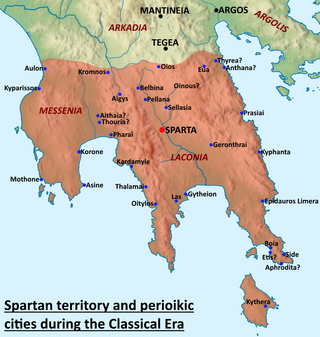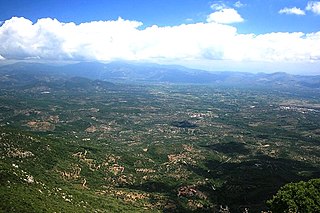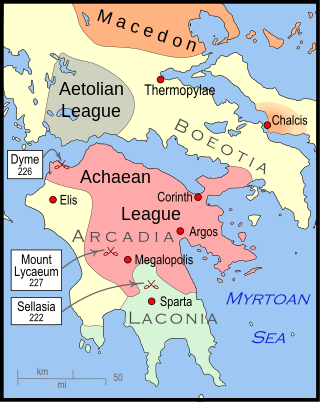Synopsis
The comic is set in 364 BC, seven years after the Battle of Leuctra where Sparta was defeated and humiliated by Thebes, shattering their image of military invincibility. It opens with a depiction of the Krypteia, an annual ritual where Spartiate youths murder the strongest Helots and terrorise the others to discourage rebellion.
Eurytos, one of the five annually elected Ephors, and his guards take shelter from a storm at a farm worked by Helots. For entertainment they force the Helots to drink unwatered wine and observe their drunken revels. Klaros, a seemingly weak cripple, refuses to drink until Eurytos' son Arimnestos forces him too, and immediately vomits after swallowing the wine. Arimnestos orders the other Helots to eat Klaros' vomit and rhapsodises the strength of the Spartiates, demonstrated by the 300 Spartans at Thermopylae. However Terpander, the overseer of the Helots, finds uncharacteristic courage in his drunkenness and mocks Arimnestos and the Spartans for their failure against the Thebans and the loss of Messenia. In response, Eurytos orders his men to kill the Helots.
Klaros escapes out of a window in the farmhouse and runs into the fields, demonstrating that his leg is healthy. He digs up a xiphos and considers fleeing, but returns to the farmstead. Klaros kills one of Eurytos' guards and Terpander and a woman named Damar stab the other to death with their knives. Eurytos begs for his life but Klaros kills him and Arimnestos flees in terror, suffering only a minor wound to his arm. Realising that the Spartiates will come for them, the three survivors decide to run and attempt to reach the free city of Messene.
In the city of Sparta, Kleomenes II, one of Sparta's two kings, watches an old man instruct a group of boys. The old man tells the boys a story of two dogs from the same litter, one raised as a hunting dog and the other as a pampered pet, the moral of the story being that their breeding as Spartiates is not enough to make them soldiers and must be matched by equally important training in the Agoge. Kleomenes reflects to Tyrtaios, his former erastes, that when he was a boy the story taught that training was more important that breeding, and Tyrtaios replies that following Sparta's loss of power and prestige they need the young to believe they are inherently superior. Suddenly Arimnestos runs into the city and announces that his father has been killed by Helots.
Kleomenes meets with the four living Ephors, who demand he take an army and hunt down the three Helots. The king is enraged at being asked to perform such a menial task and the Ephor's reverence of his co-king Agesilaos, who regularly broke Sparta's supposedly sacred laws and pardoned the men who surrendered at Leuctra while his father Cleombrotus I fought and died where he stood as Spartiates are expected to. The Ephors obliquely threaten Kleomenes, referencing the deposition and "suicide" of Kleomenes I, and he resentfully takes his three hundred hippeis to hunt three helots. Arimnestos leads the hippeis to the farmhouse. A Helot tracker named Alopex claims that the three headed north, but when Kleomenes threatens to execute his family if he lies, he admits they went west towards Messene. Kleomenes declares Arimnestos a "trembler" and an outcast. His men beat Arimnestos, forcibly shave half his beard and order him to return to Sparta.
The three take a moment to rest near a statue of Aphrodite. Klaros considers killing Terpander for causing their plight but spares him, deciding he cannot kill a man for feeling a moment of pride. Arimnestos returns to Sparta and is shunned by society and disowned by his mother. Enraged at the hypocrisy of those who shun him, many of whom surrendered at Leuctra, he steals an antique bronze panoply and weapons and his mother's champion team of racehorses, and decides to hunt the three himself. He hires Aristodemos, a Skiritai scout, to track the three. The three are forced to fight their way past a Spartiate patrol on the only bridge across the Eurotas. Klaros kills all four soldiers single-handedly, much to the other's amazement. Arimnestos and Aristodemos observe them from a high vantage point.
The three flee to the mountain passes into Messenia. Arimnestos and Aristodemos follow them in, but Aristodemos points out that Arimnestos will be outnumbered and the Helots could escape or even manage to sneak up and kill him in the rough terrain. He offers to lead the Helots into a trap in exchange for Arimnestos' horses. Aristodemos approaches the Helots as a friend and convinces them to enter a narrow pass, claiming it leads out of Laconia. In fact the pass is a dead end and they are trapped by Arimnestos. Klaros fights Arimnestos but is unable to harm him due to his superior equipment. Terpander hears Kleomenes' army drawing close and sacrifices himself by leaping onto Arimnestos' spear, allowing Klaros to kill him. Mortally wounded and dying, Terpander encourages the others to run, but they realise they cannot escape. Instead, Klaros takes Arimnestos' weapons and armour and guards the narrow pass.
Kleomenes sends his men to attack but Klaros is at the top of a steep hill and the pass forces the Spartiates to attack one at a time, allowing him to hold them off. Although both sides know he will inevitably lose, the Spartiates are taking heavy losses and Kleomenes orders them to withdraw. Klaros challenges Kleomenes to a duel but Tyrtaios answers as Kleomenes' champion. After a hard battle, Klaros is able to kill Tyrtaios but is exhausted. Terpander takes the armour and goes out of the cave. He tells the Spartiates that many more Helots died at Thermopylae than Spartiates, and that they are ready to avenge those who died for the freedom of others. Shaken by Tyrtaios' death, Kleomenes does not order another attack despite his soldiers' demand that they answer Trepander's insult. That night, Damar and Klaros have sex and Trepander succumbs to his wounds while standing guard.
Knowing they cannot hold out for another day, Klaros offers to kill Damar quickly but she takes the sword and retreats into the cave, prepared to fight the Spartiates when they come for her. Klaros dons the armour and exits the cave to face the Spartiates again. Kleomenes approaches him as if to fight but soldiers at the top of the pass simply drop a boulder onto Klaros to kill him. The Spartiates are horrified by such an "unspartan" tactic, but Kleomenes replies that they cannot afford to waste men trying to live up to Sparta's ideals. The Spartiates head into the cave and find Terpander and Arimnestos' bodies. As Arimnestos is unrecognisable due to Klaros stabbing him in the face, he is mistaken for the third Helot and the hippeis withdraw, not noticing Damar who is hiding in a crevice. When the soldiers march for Sparta, Damar is able to slip away and escape to Messene. Nine months later she gives birth to twin sons, who she names Klaros and Terpander. She tells her children that they are free.
In Egypt, Pharaoh Nectanebo I runs to the beach to meet Agesilaos and his Spartan mercenaries. As he runs he extolls Sparta's martial prowess. At the beach he does not find the expected army, but merely Agesilaos lying alone on the beach, staring out to sea. He says simply "Here lies Sparta".









